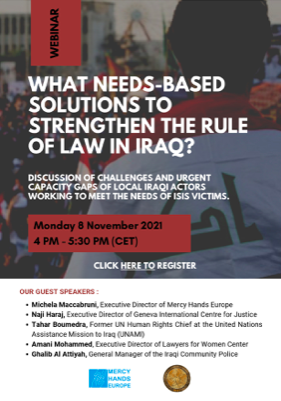Strengthening the Rule of Law in Iraq

We must build the capacity of justice system professionals and governmental bodies staff through training and joint efforts for better practice in Iraq, as well as make Iraqis aware of their rights and give them with the tools to ensure justice.
Monday, 8 November, Mercy Hands Europe and Geneva International Centre for Justice (GICJ) hosted a joint webinar to bring attention to needs based solutions to strengthen the rule of law in Iraq. The speakers were Michela Maccabruni, Executive Director of Mercy Hand Europe (INGO) & Regional Coordinator of Center and South Iraq at Mercy Hands for Humanitarian Aid (NNGO) ; Naji Haraj, Executive Director of Geneva International Centre for Justice; Tahar Boumedra, former UN Human Rights Chief at the UNAMI; and Amani Mohammed, Executive Director of Lawyers for Women Center (CSO). Mercy Hands is a European, Swiss -based NGO and work with their Iraq-based sister NGO to better Iraq and the surrounding community.
Tahar Boumedra discussed the bureaucracy in UNAMI and how it negatively impacts the effectiveness of the programs. Despite its UN-based mandate, UNAMI’s reliance on the Iraqi government’s approval strongly affects its assessments. This creates issues in the field because the UN attempts to maintain humanitarian neutrality while the government’s assessments of UNAMI are based on political motives. These objectives often do not align with each other. UNAMI resorts to unorthodox ways of convincing the government to adopt a program because of these different motives. In the end, it is hard to extract objective assessment and implementation when politics are so omnipresent. In addition, because the UN is funding UNAMI, there are often budgetary struggles that lead to the larger UN projects and committees grabbing much of the funding. In many ways, Non-Governmental Organizations can do more work than the UN agencies because of the complex bureaucracy in the UN.
Amani Mohammed presented the NGO that she runs and works for, Lawyers for Women Center (L4W). L4W was launched by Mercy Hands for Humanitarian Aid to ensure that women in Iraq are aware of their legal rights and duties and how they can defend themselves and their children. They provide legal support and psychological support to vulnerable women and children as well as capacity-building training. The three key principles are to guarantee privacy, provide early and rapid responses to start legal and administrative procedures, and ensure that all beneficiaries have access to its quality, needs-based counseling service, with assured case follow-up. The center faces challenges, which include reluctance of the beneficiaries to be open and honest about the abuse, lack of awareness in the community, low financial and logistical capacity, and the lack of Iraqi Community Police in remote areas. Solutions from their perspective include using the school system to educate children about the law, providing support to NGOs on projects like these, and influence the community to participate in these activates and grow confidence in the work.
Naji Haraj and Michela Maccabruni discussed the solutions that Mercy Hands and GICJ offer. These include building the capacity of the justice system professionals and governmental bodies staff through training and joint efforts for best practices. Specifically, legal training to Iraqi lawyers, designing a new human rights training curriculum for trainers and police officers, bringing together stakeholders in a conference that provides a safe space to share best practices and encourage reforms, and create a database of human rights mechanism obligations and recommendations and assist in follow up with the Iraqi authorities.
They then answered questions, regarding Iraq’s economic situation, and the importance of women’s participation in solution-crafting. Panelists responded that the economic situation prevents capacity-building of the government. Women’s role is a priority for Iraq, and given much importance at the UN and in NGOs’ projects.
Conclusions:
- INGOs are the ones with access to great international expertise that needs to be shared on the field.
- NGOs are the ones with access all over the field and with good relations and permissions with the governments.
- UN Agencies have the means for the realization of the majority of the activities.
- CSOs are the future, they will be still on the field once that the NGOS and UN will end their activities. They will take care of the permanent development of new activates and/or training.
- Governmental Bodies are the key element without their cooperation, approval and fortification, the improvement of the Iraqi society will be impossible.
The webinar proof how all those actors: INGOs, NNGOs, UN agencies, CSOs and governmental bodies, are linked to each other and should cooperate together to facilitate the improvement of the Iraqi society.

